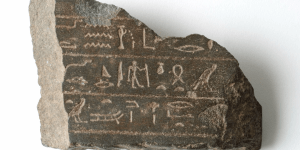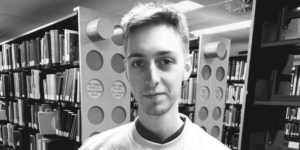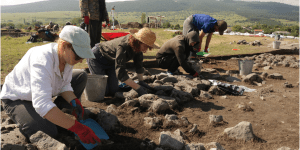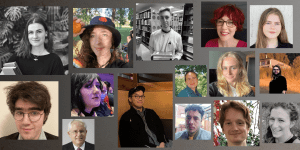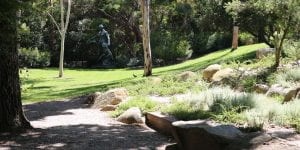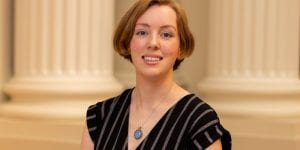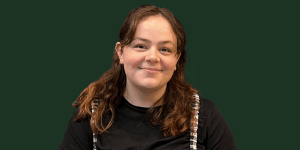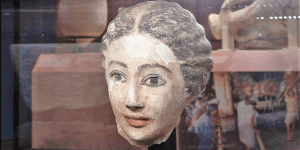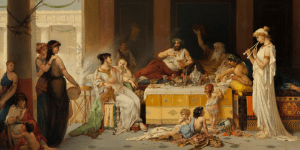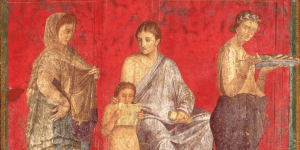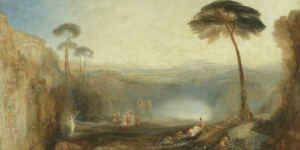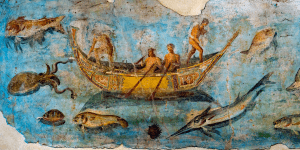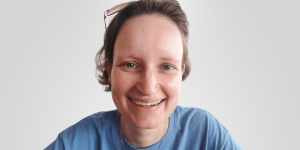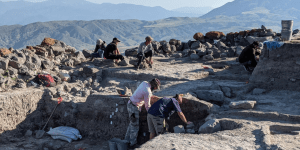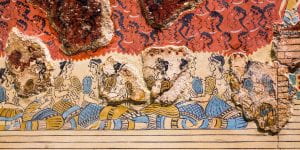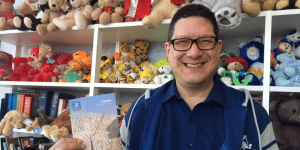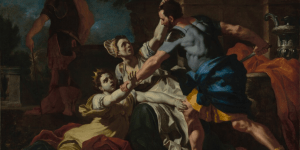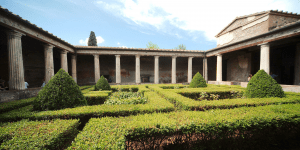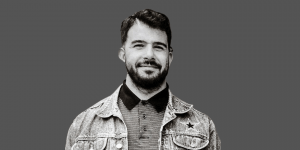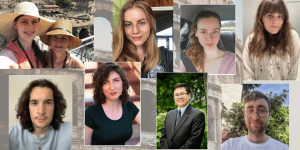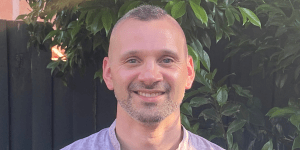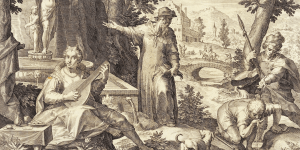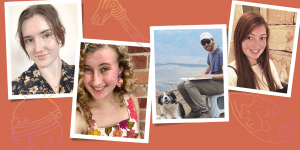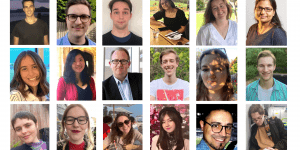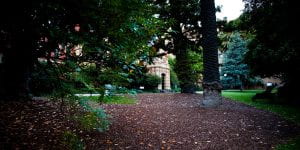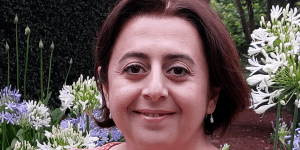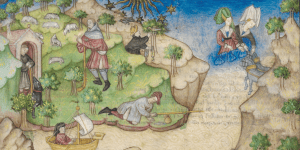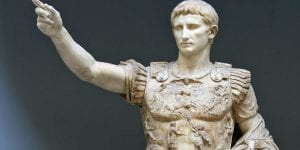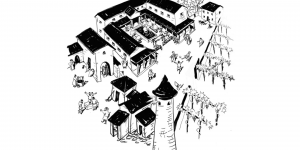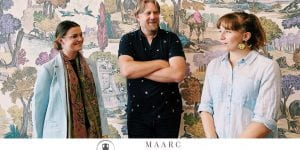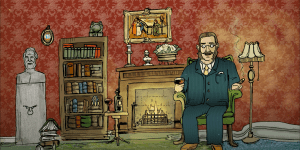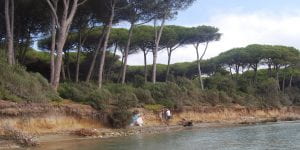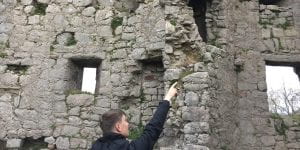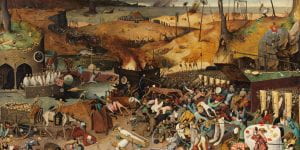Category: Classics & Archaeology
-
Rabati-2025
Around the world, when people think of Georgian archaeology, they think first of Australia because of Melbourne, so close and productive have been the relations. The Georgian-Australian Investigations in Archaeology (GAIA) project, a research collaboration between the University of Melbourne and the Georgian National Museum running since 2008, is one of the strongest cultural links between […] -
Announcing the Wright Lecture Series in Ancient Near Eastern Studies
The Classics and Archaeology program is delighted to announce the new Wright Lecture Series in Ancient Near Eastern Studies. The program has received a generous donation from Dr JJ Kim Wright (University of Melbourne alumnus) to support an annual visit and lecture by an international scholar. The programme will begin in November 2025, with Dr […] -
Exploring the World of Linear B
Linear B, a script that was used during the Bronze Age for writing in Mycenean Greek, was the subject of an interactive workshop organized by PhD candidate Emily Tour last year. Led jointly by Dr Anna Judson from Durham University (online) and Emily Tour (on site), the workshop offered participants the opportunity to experiment with […]blogs.unimelb.edu.au/shaps-research/2025/08/26/exploring-the-world-of-linear-b
-
Food in the Ancient World
Some recipes date back to ancient Rome: French toast, foie gras … and braised flamingo. What else is in the ancient Roman cookbook De Re Coquinaria? PhD candidate Christopher D Parkinson discusses his work on culinary practices, daily diet, and food culture in the ancient world, for the Conversation. Feature image: A bread stall from a […]blogs.unimelb.edu.au/shaps-research/2025/07/07/food-in-the-ancient-world
-
Computer ‘Reconstructions’ of Ancient Faces – How Reliable are They?
In recent times, the use of modern technology to reconstruct ancient faces has become increasingly popular. But can we rely on the accuracy of such reconstructions? Dr Konstantine Panegyres, McKenzie Postdoctoral Fellow in Classics & Archaeology, investigates in this article republished from The Conversation. When we read about the lives of people from the ancient […] -
Rabati Dig Report
In June 2024 the GAIA (Georgian-Australian Investigations in Archaeology) team, comprising staff and students from Classics & Archaeology, colleagues from the Georgian National Museum, and other experts and volunteers from around the globe, returned to Rabati in Georgia for the sixth year of excavations. In this report on the 2024 dig, Associate Professor Andrew Jamieson […]blogs.unimelb.edu.au/shaps-research/2024/08/27/rabati-dig-report
-
Preparing for the Ancient Olympics: Bull Wrestling, Meat-only Diets and Sex Bans
How did athletes in the Greek and Roman eras prepared in the hope of winning victory at the ancient Olympics. Some of these ways might be recognisable to modern athletes, while others could be very different. In his second article about the ancient Olympics, republished from The Conversation, Konstantine Panegyres, McKenzie Postdoctoral Fellow in Classics […] -
The Vestal Virgins: Women’s Power in Ancient Rome
In Ancient Rome, the Vestal Virgins achieved power most women were denied – but at great cost. Lily Moore, SHAPS Classics & Archaeology PhD Candidate, explores the Roman priestesses and their access to power, in this article republished from The Conversation. You might have heard of a group of women in Ancient Rome known as the […]blogs.unimelb.edu.au/shaps-research/2024/07/24/the-vestal-virgins-womens-power-in-ancient-rome
-
Love in the Ancient World
Did people in Ancient Rome and Greece love the same way we do? Perhaps even more hopelessly. Konstantine Panegyres, McKenzie Postdoctoral Fellow in SHAPS, explores ancient love stories in this article, republished from The Conversation. Sometime around 100 AD, the Roman lawyer and aristocrat Pliny sent a letter to his third wife, Calpurnia – who was […]blogs.unimelb.edu.au/shaps-research/2024/07/01/love-in-the-ancient-world
-
Staying Fit in the Ancient World
Many people today worry about how to find time to keep fit and healthy in the midst of their busy lives. Believe it or not, but this was also a problem in ancient times. So, how did ancient people deal with it? In this article republished from the Conversation, SHAPS McKenzie Postdoctoral Fellow, Konstantine Panegyres, […]blogs.unimelb.edu.au/shaps-research/2024/06/06/staying-fit-in-the-ancient-world
-
Daniel Crowley
Daniel Crowley (MA in Classics, 2024), Herodotus' Mirror: Unpacking the Purpose of the Plupastblogs.unimelb.edu.au/shaps-research/2024/05/16/daniel-crowley
-
Why is Cancer Called Cancer? We Need to Go Back to Greco-Roman Times for the Answer
Dr Konstantine Panegyres is a SHAPS McKenzie Postdoctoral Fellow, whose work explores the histories of health in antiquity. In this article, republished from The Conversation, he delves into the ancient history of representations of cancer and the origins of our word for the disease. One of the earliest descriptions of someone with cancer comes from […] -
Ancient Languages Boom!
Undergraduate enrolments in ancient languages are soaring at the University of Melbourne, with the number of students signing up for beginners’ level Ancient Greek, Ancient Egyptian, and Latin undergoing a dramatic rise in 2023 and 2024. Ancient World Studies PhD student Noah Wellington reflects on the reasons behind this. Scholars have studied the ancient world […]blogs.unimelb.edu.au/shaps-research/2024/04/26/ancient-languages-boom
-
Leo Palmer
Leo Palmer (MA in Classics, 2024), Athenian Democracy in Context -
Rabati 2023: Report on Georgian-Australian Investigations in Archaeology
The Georgian-Australian Investigations in Archaeology (GAIA) project is a research collaboration between the Georgian National Museum and the University of Melbourne. GAIA was established by the late Emeritus Professor Antonio Sagona and Dr Claudia Sagona. SHAPS’s Andrew Jamieson reports here on the 2023 season of the GAIA dig at Rabati, with contributions from Brian Armstrong, Giorgi Bedianashvili, Catherine Longford, Abby Robinson, Claudia Sagona and Martin Tomko. -
Celebrating Student Successes in History & Ancient World Studies
As the year draws to a close, we look back on the achievements of our students, awarded prizes in 2021 for their outstanding work in History and Ancient World studies. Winner of the 2021 Gyles Turner Prize, Maya Del Rio Reddan The Gyles Turner Prize is awarded annually for an undergraduate essay in Australian history. […] -
Martin Carnovale
Martin Carnovale (PhD in Classics & Archaeology, 2023), The Language of Archaeological Investigations The thesis explores whether methods based upon analogical reasoning can be used to interpret culture if there are difficulties of translating other culture’s beliefs. The kind of cultural interpretation that I will discuss is that which pertains to social, artistic and religious […]blogs.unimelb.edu.au/shaps-research/2023/10/31/martin-carnovale
-
Birds in Roman Life and Myth
Dr Ashleigh Green recently published her first book, Birds in Roman Life and Myth. In 2020, her PhD thesis in Ancient World Studies passed examination without corrections. She went on to hold a La Trobe Society Fellowship at the State Library of Victoria in 2022 and is now a Teaching Associate in the School of […]blogs.unimelb.edu.au/shaps-research/2023/09/13/birds-in-roman-life-and-myth
-
Robyn Cooper
Robyn Cooper, (MA in Classics & Archaeology, 2023) ‘Romans, Religion, and Residences: Investigating the Relationship of Domestic Spaces and Roman Homes throughout Pompeii, Herculaneum, and the Iberian Peninsula’ Using domestic cult spaces as a source material, this project explores how the nature of space within Roman residences interacted with and influenced on the expression of religious […] -
Beauty, Wine and Death in the Ancient World
Picture a woman gazing at her face in a small mirror of highly polished brass. She has never seen her whole body – no mirror is that large in the Greek and Roman worlds. She whitens her face with powdered chalk and reddens her cheeks with a dye made from the madder plant. Her fingers […]blogs.unimelb.edu.au/shaps-research/2023/08/03/beauty-wine-and-death-in-the-ancient-world
-
Policing Women’s Drinking in Ancient Rome
SHAPS PhD Candidate Lily Moore (Classics & Archaeology), explores the consequences of imbibing alcohol for Roman women in this article, republished from The Conversation. The ancient Romans venerated wine. It was accessible to the masses, a fundamental staple of mainstream life, and an indispensable part of the Roman economy and trade. It was utilised in […] -
Happy Ancient Roman Mother’s Day
SHAPS Honorary Tamara Lewit explores the celebration of Mother’s Day in ancient Rome, in this article, republished from Pursuit. Although the words ‘ancient Rome’ might evoke marching armies or gladiatorial combats, those armies and gladiators would never have existed without their mothers. Like us, the Romans celebrated a Mother’s Day. But never mind breakfast in […]blogs.unimelb.edu.au/shaps-research/2023/05/14/happy-ancient-roman-mothers-day
-
Revisiting Frazer’s Golden Bough
In February 2023, Dr Caroline Tully, archaeologist and honorary fellow in SHAPS, and Dr Stephanie Budin, ancient historian and independent scholar, hosted the international conference Shaking the Tree, Breaking the Bough. Designed to interrogate the influence of Sir James G Frazer’s (1854–1941) magnum opus, The Golden Bough: A Study in Comparative Religion, first published in […]blogs.unimelb.edu.au/shaps-research/2023/04/11/revisiting-frazers-golden-bough
-
All Rivers Lead to Rome
SHAPS Honorary Fellow Tamara Lewit explores the rivers of the Roman Empire and their river craft in this article, republished from Pursuit. The expression ‘All roads lead to Rome’ encapsulates the might of the Roman Empire, but the arteries which carried its lifeblood – food, fuel, livestock and luxuries – were not roads, but rivers. […]blogs.unimelb.edu.au/shaps-research/2023/04/04/all-rivers-lead-to-rome
-
Madaline Harris-Schober
Madaline Harris-Schober (PhD in Classics & Archaeology, 2023) ‘Ritual Architecture, Material Culture and Practice of the Philistines’ This thesis focuses on the recognition of cult and ritual in the Late Bronze Age [LBA] to Iron Age (1175–586 BCE) Levant. It is concerned with the identification and elucidation of ritual architecture, material culture and practices based […]blogs.unimelb.edu.au/shaps-research/2023/03/07/madaline-harris-schober
-
Elena Heran
Elena Heran (PhD in Classics & Archaeology, 2023), ‘Sidelining the Feminine in Ovid’s Metamorphoses’ This thesis answers two key questions regarding the treatment of gender in Ovid’s Metamorphoses: 1) How does the poem utilise mythical narratives in order to explore peculiarly Roman masculine concerns and anxieties, such as fatherhood, the transition from boy to man, the […]blogs.unimelb.edu.au/shaps-research/2023/03/01/elena-heran-2
-
A Settlement for the Ages at Rabati, Southwest Georgia
The Rabati project is part of the long-running GAIA (Georgian-Australian Investigations in Archaeology) initiative, founded by Tony and Claudia Sagona of the University of Melbourne with collaborators from the Georgian National Museum in Tbilisi. In June and July 2022, GAIA conducted its fourth season of excavations at Rabati in the historically important and visually stunning […]blogs.unimelb.edu.au/shaps-research/2022/12/19/a-settlement-for-the-ages-at-rabati-southwest-georgia
-
Think you know your Ancient History?
If you can identify your per se from your id est, or rattle off the Seven Wonders of the Ancient World, test your wits against our Classics knowledge experts, Roslynne Bell and Tim Parkin from SHAPS, and get your brain warmed up for the real-life Classics Quiz on 23 November. Republished from Pursuit. Answers are […]blogs.unimelb.edu.au/shaps-research/2022/11/02/think-you-know-your-ancient-history
-
An Interview with Associate Professor James Chong-Gossard
SHAPS belatedly, if most cordially, congratulates James Chong-Gossard on his promotion to Associate Professor of Classics. James Harvey Kim On Chong-Gossard (affectionately known as K.O.) was born in Pennsylvania and raised in Ohio, went to grad school at the renowned University of Michigan and taught at Kalamazoo College, before migrating to Melbourne a little over […] -
The SHAPS Hellenic Ball
This winter, SHAPS undergraduate student societies came together to embark on an ambitious and rewarding undertaking. Abigail Banister-Jones, Co-Consul/President of MUCLASS (Melbourne University Classics & Archaeology Student Society), reports on the inaugural SHAPS Ball below. Where else does one throw a ball for classics, history and philosophy students but the Hellenic Museum? Surrounded by artefacts […]blogs.unimelb.edu.au/shaps-research/2022/08/15/the-shaps-hellenic-ball
-
Domestic Violence and the Law in Ancient Rome
Ancient Rome didn’t have specific domestic violence legislation – but the laws they did have give us a window into a world of abuse. In this article, republished from the Conversation, SHAPS's Tim Parkin and Ash Finn, together with University of Sydney's Eleanor Cowan and Kimberly Harris; and Kirsten Parkin (University of Cambridge), discusses evidence for family violence in the Roman world and legal frameworks that both enabled and addressed it. Readers are advised this story includes depictions of domestic violence and violence against women and children.blogs.unimelb.edu.au/shaps-research/2022/06/01/domestic-violence-and-the-law-in-ancient-rome
-
MAARC 2022 Conference Report
On 31 January-2 February 2022, SHAPS hosted the second Mediterranean Archaeology Australasian Research Community (MAARC) online conference. This event brought together researchers, students and ancient world enthusiasts from across the globe to share in some of the most recent and exciting updates in the Mediterranean archaeology space. Emily Tour (PhD candidate, Classics & Archaeology) shares […]blogs.unimelb.edu.au/shaps-research/2022/05/09/maarc-2022-conference-report
-
Athanasios Matanis
Athanasios Matanis (MA in Classics & Archaeology, 2022) ‘Beyond an Antagonistic Approach: the Role of Universalism in the Formation of Koine Culture’ Classical scholarship has tended to emphasise dichotomies and polarity when addressing the topic of Greek/non-Greek relations in antiquity. This anachronistic paradigm however is insufficient for understanding the multidimensional nature of Greek/non-Greek interactions and […]blogs.unimelb.edu.au/shaps-research/2022/03/28/athanasios-matanis
-
MUCLASS in 2021
Melbourne University Classics and Archaeology Students Society (MUCLASS) is a club for anyone interested in ancient history, mythology, archaeology or the Classics. They run a broad range of social and academic events, including trivia nights, museum visits, board game sessions, and film screenings. In this profile, we look at their achievements in 2021 and plans […]blogs.unimelb.edu.au/shaps-research/2022/03/21/muclass-in-2021
-
Giovanni Piccolo
Giovanni Piccolo (PhD in Classics & Archaeology, 2022), ‘The Collectanea Rerum Memorabilium by Gaius Julius Solinus: A Roman Geography for a Changing World’ The Collectanea Rerum Memorabilium is a collection of wondrous facts from various areas of natural science presented within the geographical framework of a description of the known world. Little is known of […]blogs.unimelb.edu.au/shaps-research/2022/03/07/giovanni-piccolo
-
Safe Sex – Roman Style
A video-recording of Professor Tim Parkin's presentation to the SHAPS Fellows & Associates Seminar (October 2021)blogs.unimelb.edu.au/shaps-research/2022/02/21/safe-sex-roman-style
-
Stephanie Zindilis
Stephanie Zindilis (MA in Classics & Archaeology, 2022) ‘Distaff Displacement: Narratives of Female Exile in Ovidian Poetry’ Displacement is a torment experienced by numerous women in Ovid’s Heroides and Fasti. Reading these episodes from a gendered perspective reveals nuances in the female vs. male experience of exile, broadening understanding of how exile is experienced by […]blogs.unimelb.edu.au/shaps-research/2022/02/13/stephanie-zindilis
-
How to Pursue a Career in Archaeology
In this interview, four of our recent graduates share their insights and advice on how to go about building a career in archaeology. Current PhD candidate Tom Keep spoke with Monique Corbett, an archaeologist working with Heritage Insight; Rachel Slocombe, a subcontracting archaeologist who is currently working with Australia Cultural Heritage Management; Gemma Lee, a […]blogs.unimelb.edu.au/shaps-research/2022/01/24/how-to-pursue-a-career-in-archaeology
-
Celebrating Our Students’ Achievements
Looking back on last year’s note of congratulations to our student award recipients, I noted then the extraordinary (pandemic-driven) conditions during which the students were working. This year the point is doubly true and needs to be acknowledged explicitly. Most of the work that is being awarded by these prizes was done remotely, often independently, […]blogs.unimelb.edu.au/shaps-research/2021/11/15/shaps-student-prizes-scholarships-2020
-
John Henry
John Henry (MA in Classics & Archaeology, 2021) ‘Femina Necans: A Study on Gendered Violence in Greek Tragedy’ In Greek tragedy, there were various methods available for a tragic woman to destroy her enemies: poison, a sword or dagger used in stealth, among other indirect methods. In this thesis, Femina Necans, these tropes will be […] -
Bengi Selvi-Lamb
Bengi Selvi-Lamb (PhD in Classics & Archaeology, 2021) ‘Kura-Araxes Obsidian: A Case Study from Sos Höyük‘ The Kura-Araxes complex has a distinctive material assemblage that stretched across a wide geographical area from the Transcaucasus, through Lake Urmia basin in Northern Iran to Eastern Turkey and the Upper Euphrates region over at least 1000 years (3500–2400 […]blogs.unimelb.edu.au/shaps-research/2021/10/23/bengi-selvi-lamb
-
Why Study Ancient Languages? An Interview with Dr Edward Jeremiah and Dr Andrew Turner
We are excited to announce the appointment of Dr Edward Jeremiah and Dr Andrew Turner as Teaching Specialists in ancient languages. Andrew and Edward play key roles in introducing our students to Latin and Ancient Greek, and guiding them through their journey as they learn to read classical texts in the original language. In addition […]blogs.unimelb.edu.au/shaps-research/2021/08/23/why-study-ancient-languages
-
Control & the Imagery of Power: The Case of Emperor Augustus
Episode 1 in the 2021 SHAPS 'Control' Podcast Series: Dr Roslynne Bell (Classics & Archaeology).blogs.unimelb.edu.au/shaps-research/2021/06/28/augustus-public-image
-
What was it Like to be a Child in the Roman Empire?
As the researcher for a new children’s novel set in Ancient Roman times, archaeologist and SHAPS Honorary Tamara Lewit found herself hunting for answers to questions she’d never considered. She tells us about Roman childhood in this new article republished from Pursuit. What would a school day be like in 313 CE? What games would […]blogs.unimelb.edu.au/shaps-research/2021/06/02/what-was-it-like-to-be-a-child-in-the-roman-empire
-
Introducing Dr Monique Webber, Teaching Specialist in Ancient World Studies
We are delighted to announce the appointment of Monique Webber as Teaching Specialist in Ancient World Studies. In this role, Dr Webber will coordinate a suite of subjects: Myth, Art and Empire: Greece and Rome (ANCW10002); Classical Mythology (ANCW20015); and Underworld and Afterlife (ANCW30011). Specialising in Object-Based Learning and Digital Humanities, Monique is a skilled […]blogs.unimelb.edu.au/shaps-research/2021/05/20/introducing-dr-monique-webber
-
Mediterranean Archaeologists Gather Online
In January 2021, over 200 archaeologists of the Mediterranean came together online for the inaugural Mediterranean Archaeology Australasian Research Community (MAARC) conference. The digital conference, organised by Gijs Tol, Emily Simons, Madaline Harris-Schober, and Larissa Tittl (Classics & Archaeology) surpassed all expectations in numbers of participants and sheer diversity of papers. Emily and Maddi report […]blogs.unimelb.edu.au/shaps-research/2021/04/01/mediterranean-archaeologists-gather-online
-
Classics on YouTube: An Interview with John Henry
In 2018, current MA candidate in Classics John Henry created his own YouTube channel, Foxwede History, where he delivers mini-lectures on myth, literature and history through his alter ego, Dr Eldon Foxwede. Beautifully produced and presented with humour and creativity, his videos have drawn an audience from many different countries. We spoke with John about […]blogs.unimelb.edu.au/shaps-research/2021/02/09/classics-on-youtube-an-interview-with-john-henry
-
Introducing MAARC: A New Network for Mediterranean Archaeologists in Australasia
In 2020, Gijs Tol (University of Melbourne) and Jeremy Armstrong (University of Auckland) led a new initiative aimed at bringing together Australasian archaeologists of the Mediterranean. The result is a new organisation, MAARC (Mediterranean Archaeologists of Australasia Research Community). MAARC is set to hold its inaugural annual meeting, hosted by the University of Melbourne (in […] -
Spotlight on Postgraduate Research in Classics
Read about some of the fascinating doctoral projects currently underway in Classics and Ancient History, courtesy of the Classics & Archaeology Postgraduate Society. The Society’s committee members gathered these profiles together as part of their August 2020 Classics Week initiative, designed to make up for the loss of the usual March 2020 Classics Week, which […]blogs.unimelb.edu.au/shaps-research/2020/09/25/spotlight-on-postgraduate-research-in-classics
-
Other Awful Years in History
Around the world, people can’t wait for 2020 to end. COVID-19 has killed close to a million people globally over the course of the pandemic. On top of the coronavirus, there’s been significant floods in Uganda, Kenya, Pakistan and the UK, Australia has experienced devastating bush fires, storms have battered the Americas, and locusts have […]blogs.unimelb.edu.au/shaps-research/2020/09/21/other-awful-years-in-history
Number of posts found: 92












